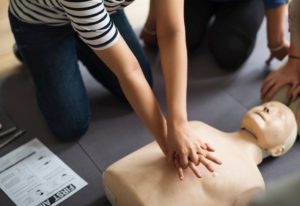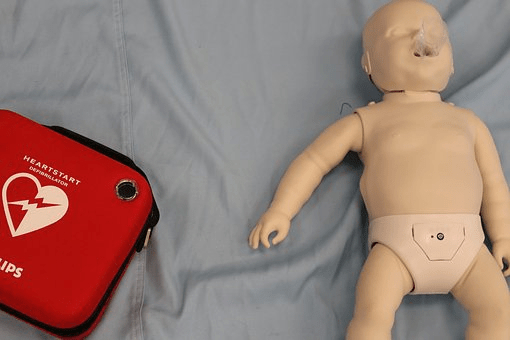A Look at the Legal Side of CPR
The legal side of CPR is a must, especially if you want to avoid being sued! We’ve all been there – an emergency just happened, and we must do something to save someone’s life. A huge percentage of the American population has undergone safety training and can provide first aid. Providing a quick response to those in danger is important and can save their lives. In the United States, the most common scenario would be someone falling on the ground because of a sudden heart attack. People who know how to provide cardiopulmonary resuscitation (CPR) typically try to help revive the patient; however, some people are reluctant to help because they believe they can be sued.
In this article, we will look at the legal side of CPR and discover the truth about this first aid response. There are many misconceptions about CPR, and people need to know the consequences (if there are any). Several organizations in the United States are promoting CPR and training thousands of people on how to respond. However, the misconception about CPR makes other people afraid of helping during emergencies. Organizations promoting CPR state that no one should feel intimidated by giving help to other people because of these misconceptions, and they need to understand the process and see how it can work out.
What is CPR?
CPR is a first aid treatment for someone suffering from a heart attack, and it is also a common first aid response for those who have drowned and need water pumped out of their lungs. Many people in the United States have undergone CPR training and receive certification after finishing the course. People trained in CPR are useful in emergencies, and the knowledge they acquire regarding the practice can help thousands of lives. However, there is a circulating misconception that people who provide CPR can be sued.
The truth about this is that a law protects those helping others by using a first aid response. The Good Samaritan Law varies per state, but it all boils down to a simple rule – no one should be prosecuted because they want to help someone in trouble. CPR can be performed by anyone who has had training, and those who have not received training can help through other means – resuscitating someone without prior training can land you in trouble if it worsens a patient’s condition.
Who Can Perform CPR?
Two types of people can perform CPR on someone in an emergency. People who work in the medical industry fall into the first category. Physicians, nurses, emergency respondents – all of them are required to perform CPR when they see someone who needs it. Medical professionals are expected to act when they see someone asking for help, and not providing any first aid treatment can land them in trouble only when “on duty.” Their medical knowledge can help save a life, and the government expects them to act based on instinct if the emergency happens, while “off duty” is a personal choice of whether to respond. Keep in mind legislation varies from state, so research applicable local laws.
People who have trained for CPR fall into the second category. They might not have any professional background in the field of medicine, but learning how to provide CPR is enough. These people are not required to help during emergencies, except in Vermont. Providing CPR should be based on their decision, and sometimes, they are also required to ask permission from the person who just had an attack. However, when the patient cannot speak, the people responding first should state that they acted based on the circumstances.
The Importance of Providing CPR During Emergencies
Providing CPR is important because studies show that the brain starts to die four to six minutes after a heart attack. If someone assists during this crucial period, they can save a life. Emergency respondents might arrive later than four to six minutes, and assistance from bystanders is needed when someone has a massive heart attack. Providing CPR, especially when the patient is outside the hospital or any medical facility, can extend their lives, especially if performed correctly. Organizations in the United States, like the American Heart Organization, actively promote providing CPR and using an AED.
What is the Good Samaritan Law?
When looking at the legal side of CPR, The Good Samaritan Law protects bystanders who provide first aid to someone during an emergency. Many people in the United States fear that they can face legal consequences if they help someone, especially if they do not have a background in the field of medicine.
Recent events where employees refused to perform CPR because it went against their employer’s practices and guidelines raised plenty of questions – people started asking if it is ethical for medical professionals and people who work at medical facilities to refuse CPR. People also began questioning if they could be sued if they performed CPR without any training.
The Possibility of a Lawsuit and Legal Side of CPR
There is a lot of misconception regarding providing CPR, especially if you do not have a license. However, the truth is that laws have been enacted to ensure that the bystanders responding to an emergency will have protection from any lawsuits – but there is a catch – some actions beyond CPR are prohibited. The Federal Cardiac Arrest Survival Act, which was approved in 2000, stated that people who provide CPR or use an AED are exempt from civil charges. However, if the court finds out that there is evidence pointing to gross negligence and willful misconduct, charges can be filed.
The Good Samaritan Law shields the bystanders from any charges whenever they help someone during an emergency. However, the application of the law differs per state. Some states ensure protection for anyone stepping in to perform CPR. Other states require medical professionals and those who are certified to act. Vermont requires everyone to help during an emergency, and those who refuse to assist can be fined (maximum of $100).
There are some instances where the Good Samaritan Law would not apply, especially when someone performs a medical practice without a license. For example, someone performing an on-the-spot surgery without certification could face legal charges. Laws in the United States require surgeons to be registered as professionals before performing these tasks. CPR is different because there are no surgeries involved. Another instance when the Good Samaritan Law cannot be applied is when the respondent displayed reckless and negligent behavior that could endanger the patient’s life. Courts rule out that these behaviors should not be tolerated, and the person involved should be charged.
The Impact of a Do Not Resuscitate Order
A “do not resuscitate” order (DNR) is granted to some patients who wish not to be revived whenever they experience cardiac arrest. If the respondent knew that the patient had a DNR and they proceeded to provide them with CPR, they could be sued. However, they cannot be sued if the respondent does not know the patient’s DNR. Just like the Good Samaritan Law, DNRs also vary per state. There are states where the DNR is only applicable when applied inside a medical facility and does not have any effect outside. In these states, medical professionals can provide CPR, even if they know that the patient has a DNR, provided they are giving it outside the medical facility.
On the other hand, some states prohibit medical professionals from doing anything to someone with a DNR and are abiding by the laws to protect themselves from being prosecuted. Some states also require patients to tell their providers about the DNR.
Should You Fear Legalities When Responding to Emergencies?
If you are a bystander, the short answer is no, and if you are working as a medical professional, it depends on the situation. Those performing CPR in an emergency should not worry about being prosecuted because of the protection guaranteed by several laws, but one should know its restrictions. It is important to act on a selfless impulse to save the lives of those in danger. Respondents do not need to worry when the act is performed because of this impulse, and they can get away with their actions. However, it is a different story when someone receives monetary compensation for what they did. Some states prohibit receiving compensation after assisting, and those who accept monetary compensation can face extreme consequences, especially regarding the immunity promised under the Good Samaritan Law. The best way to protect yourself whenever you help someone is to refuse any monetary payment for your services.
Encouraging the Public to Learn CPR and Know the Legal Side of CPR
CPR is an important practice, and it can save lives. Therefore, several organizations in the United States are actively promoting the practice to the population. They want people to learn how to provide CPR because it can extend someone’s life, especially if the emergency responders are still too far from the scene. Reports about individuals getting sued after helping are being amplified in the media, but pro-CPR organizations state that these stories are rare and do not happen frequently in real life.
Information on Local Laws
You can stay away from legalities if you also take some time to read the local laws practiced in different states. You need to find out how these states are applying these rules and regulations and how you can circumnavigate them. Lawsuits against medical professionals and emergency respondents are filed because of money talks. If you know the situation, you can protect yourself from the lawsuit being filed. However, this should not discourage you from helping others in need.
Conclusion of the Legal Side of CPR
In the United States, everyone has a chance of being sued for anything – even for the most ridiculous reasons. Giving CPR might land you in trouble, but only if the circumstances do not favor your side. Reading material about local laws and knowing the legal side of CPR will help you avoid the charges, and you also need to work with a good lawyer who can help regarding this trouble surrounding the lawsuits filed against respondents during an emergency. The most important thing is that you are extending your arm for help and are trying to give those in need the assistance they deserve.



